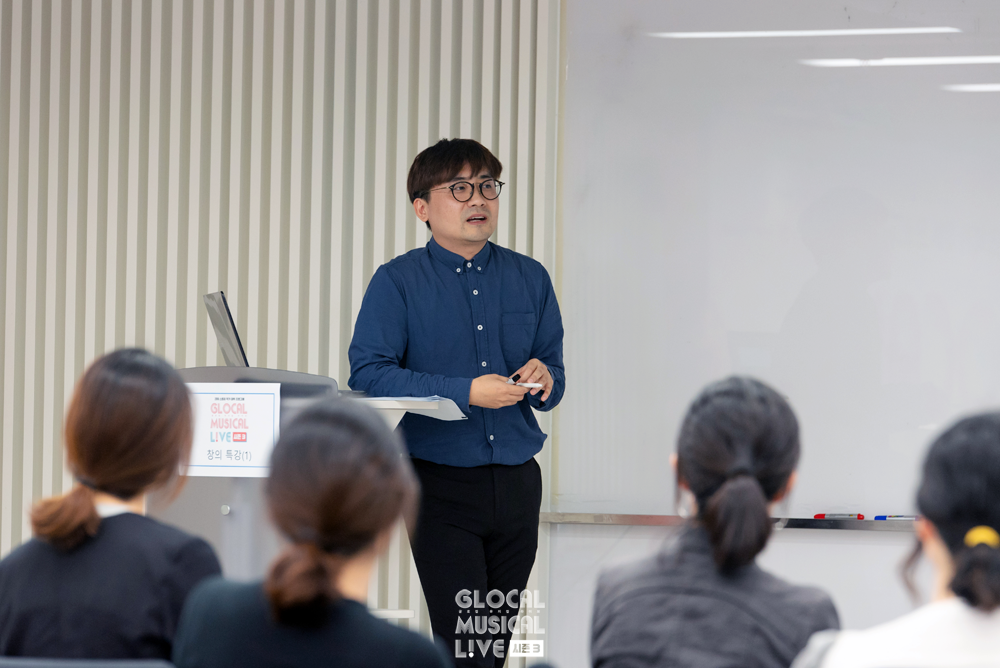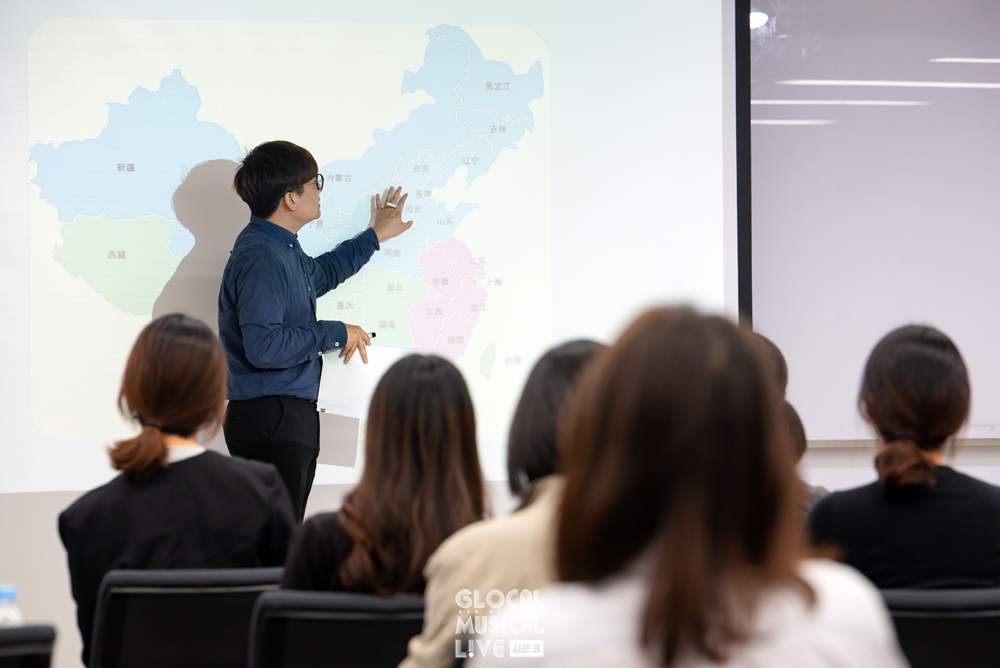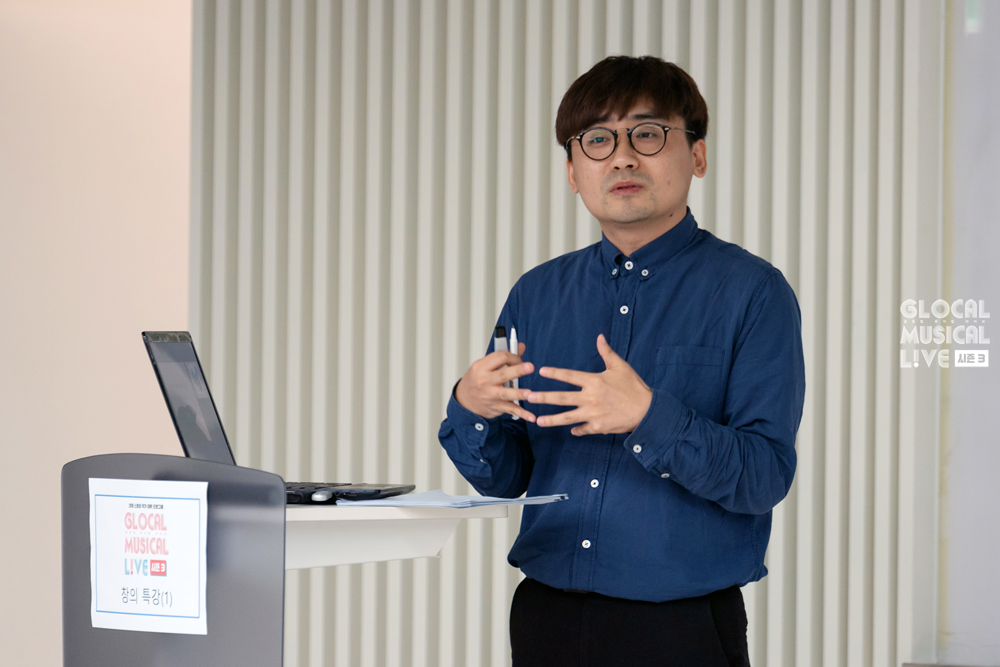Creative Lecture 2 (Advance into the global market) 2018 Direction and success strategy of the creative musical in China market
Date and Time: Sep. 28, 2018 14:50 ~ 15:50
Place: 16th floor of the Conference room at the Contents Korea LAB in Kwanghwamoon
Lecturer: WANG HAIXIAO (CEO of Nanjing culture diffusion Ltd.)
The second lecturer, CEO WANG is an expert producer in China who produced ‘Ppalle; the washing’ and ‘Thrill Me’. He mentioned that he’s been experienced for 10 years in Korea to work for the performance department and his experiences helped him producing in China since 2015, and said, “In accordance with the increase of interest about the musical market in China, the chance of cooperation with both the creators in Korea and China is increasing.” He expected the two countries’ cooperation of creation in China sooner or later.
Shanghai, the core city of Chinese musical business
China is such a huge market including HongKong, Taiwan, Malaysia and Singapore over China. But in case of musical, there are three core cities. Guangzhou at the South, Beijing at the North, and Shanghai at the East. When watching musical tours in China, these three core cities are mainly positioned, and others are used to have those kind of musical tour schedule at each capital of that city just like a suburban cultural event. Beijing among the 3 core cities has higher interests about the musical due to the fact that it was a central and historical place of politics / culture in China, however, Shanghai, the city of industry became the most important city among the Chinese musical market because the musical should be provided by the huge capital strength. Many musical creators in Beijing came to Shanghai, and various seminars and workshops with related to the musical are actively held in Shanghai.

The inflection point of musicals in China
He added, “There were many turning points in the history of Korean musical. So were in China.” And he started explaining the inflection point of musicals in China. First point was ‘Le Miserable’ in Shanghai National Center for the Performing Arts in 2002. This was the first musical in China, and so at that time the genre ‘musical’ was known to ‘AINKER(愛人客)’ which stands for the Chinese musical fans. After that, famous works such as ‘CATS’ and ‘Phantom of Opera’ got their tours, however they were not played in Chinese. The second inflection point was a real license musical written in Chinese for the first time in 2012 with ‘Mamma Mia!’. In that time finally Chinese audiences recognized that musicals could be played in Chinese language, and famous musicals like ‘CATS’ became licensed after that period. ‘Thrill Me’ in 2016 was a chance to break prejudice of Chinese audiences that ‘musicals always have to be huge and splendid.’ Through ‘Thrill Me’ which made them to concentrate on the story and characters, so called ‘Revolving door audiences’ occurred in China.
He said, “At the beginning of this year, one more special turning point came out” by talking about ‘Mozart Opera Rock’. He added, “Many staffs in musical business do not know this work, but lots of young Chinese liked this combination with the image of Mozart and Rock. This also played a role to dig up some other musical audiences in China.” WANG talked about a culture of audiences to take photos by wearing costume play of characters, and said, “I think the Chinese audiences are a little bit different from that of 20 to 30 year old age Korean audiences.”

The biggest assignment for advancing into China market, localization and contents review
WANG said his thought, “According to the musical history in Korea, I believe that China should also have musicals which are translated in Chinese for increasing its market size.” by saying the difficulties of localizing the process to import works from other countries. At first, it’s so difficult to translate the title of musical. The titles of ‘Lion King’, ‘Kinky Boots’ and ‘Jekyll and Hyde’ are naturally used just in English, however, Chinese characters are ideograms so there is nothing but to change the titles. As a result, the titles of those musicals have been changed into some sort of weird titles like, ‘SAJA WANG’, ‘BOOTS HWANGHOO’, and ‘BYUN SHIN GUI UI; Transforming strange doctor’.
Also, there is no subtitle in Korea when playing with its own language, China has it even playing with chinese language. WANG said about this, “It’s hardly possible for us to understand without the subtitle because the lyrics are not easily understandable to anyone but just made to be like beautiful ones.” He thought that transferring meaning is first, and aesthetic is second issue, and told his experience, “When playing ‘Thrill Me’, I wrote and composed lyrics as much understandable as possible to anyone.” So some say that it was good, but some say ‘Can it be a song?’, therefore each work won’t be necessary to depend on subtitles less than present if audiences find lyrics that they can feel and adjust easily.
Besides localization, there is another issue for contents review as well. In China, you need to get an appropriate review before playing your work. Without passing the review, you can’t play your work on a stage. In case of ‘Ppalle; the washing’, it might be possible to pass the review if the background was revised into China. On the circumstance that illegal workers are arrested in China, there might be a question, ‘Why does this story tell about love of illegal workers?’ WANG put his opinion and said, “The condition of this review is very much confusing, so that we always discuss long time with creators of the imported musical for this reviewing issue.”

As is and To be of the creative musical in China
WANG said that he got many questions like, ‘What kind of musical would be successful in China?’ For that question, some producers answer with ‘romantic comedy’, some say ‘splendid performance’, and some say ‘family musical.’ WANG thinks that all those answers are correct. However, WANG thinks that the splendid musicals should have their own good stories inside rather than just splendid, or some musicals only for the main male actors and ‘Thrill Me’, ‘Mozart!’ must have their own market in China. Because China is still a potential market for further development and possibility. In his eyes, the biggest problem is that, the production standard of the present works is not that high, so that audiences can hardly feel touched. He pointed out the assignment of the musical market in China as ‘narrowing the huge difference of standard between the licensed musical and creative musical.’ WANG added about his present works, “I am trying to show another possibility to Chinese audiences and staffs” and lastly he hoped many musicals which advance into China would have their own ‘creativity and originality.’






